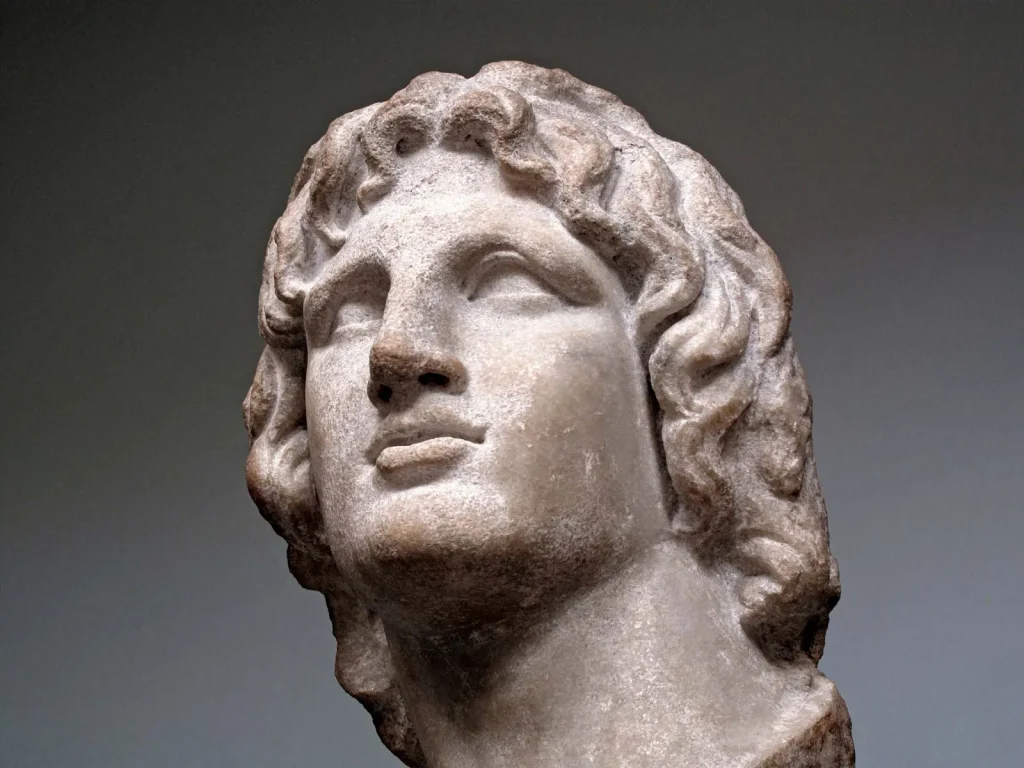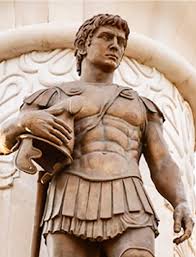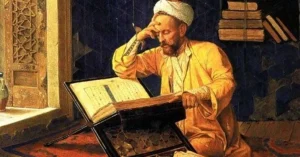
Alexander the Great at a Glance
Full Name: Alexander III of Macedon
Born: July 356 BCE in Pella, Macedon
Died: June 323 BCE in Babylon, aged 32
Father: King Philip II of Macedon
Mother: Queen Olympias
Spouse: Roxana of Bactria (among others)
Notable Nicknames: “Alexander the Great”, “The King of Kings”, “The Macedonian Conqueror”

Key Achievements
- Unification of Greece: After his father’s assassination in 336 BCE, Alexander united the Greek city-states under his rule and formed the Corinthian League, ensuring peace and stability in the region.
- Conquest of the Persian Empire: Over the course of several years, Alexander defeated the Persian Empire in major battles including Granicus, Issus, and Gaugamela, eventually bringing down the Achaemenid dynasty and establishing Macedonian rule from Greece to Egypt and India.
- Cultural Integration (Hellenization): Alexander spread Greek culture across the vast territories he conquered, promoting Hellenistic culture, which blended Greek traditions with those of Persia, Egypt, and Central Asia.
- Founder of Cities: He founded more than 20 cities, the most famous being Alexandria in Egypt, which became a hub of culture, learning, and commerce.
- Military Genius: Known for his strategic brilliance, Alexander never lost a battle, using innovative military tactics and diplomacy to conquer vast regions.
Alexander the Great, born in 356 BCE in Pella, the ancient capital of Macedonia, is one of the most legendary figures in world history. His legacy is vast and multifaceted, influencing not just the world of his time, but shaping the course of civilizations for centuries to come. Here are some of the key elements of his enduring legacy:
1. Conquest and Expansion of the Empire
Alexander’s military campaigns are legendary. He expanded the Macedonian Empire from Greece to Egypt, Persia, and into India, creating one of the largest empires in history. His conquests were marked by rapid military victories and strategic brilliance. By the time of his death in 323 BCE, Alexander had united a vast region, stretching from Greece to modern-day Pakistan. This unprecedented expansion forever altered the political landscape of the ancient world.
2. Hellenistic Culture
One of Alexander’s most significant contributions was the spread of Greek culture, philosophy, and knowledge across his empire. As he conquered new lands, Alexander encouraged the blending of Greek culture with local traditions, giving birth to the Hellenistic civilization. Cities like Alexandria in Egypt became intellectual and cultural hubs, where Greek philosophy, art, and science flourished. This fusion of cultures led to advancements in philosophy, mathematics, astronomy, and literature.
3. Founding of Cities
Alexander the Great founded more than 20 cities, many of which carried the name “Alexandria.” These cities became centers of trade, culture, and learning. The most famous, Alexandria in Egypt, became one of the greatest cities of the ancient world, home to the Great Library of Alexandria, a symbol of knowledge and scholarly achievement.
4. Promotion of Religious Tolerance
Despite his military conquests, Alexander showed a notable degree of religious tolerance. He adopted many local customs, including Persian dress and rituals, and encouraged his subjects to practice their own religions. This approach helped maintain stability within his diverse empire, which included Egyptians, Persians, Greeks, and Indians.
5. The Spread of Greek Language
One of the lasting effects of Alexander’s empire was the widespread use of the Greek language. Greek became the lingua franca of the region, facilitating communication, trade, and intellectual exchange. It also laid the foundation for the subsequent spread of Christianity, as the New Testament of the Bible was written in Greek.
6. Military Innovations
Alexander’s military strategies and tactics are still studied in military academies around the world. His use of the phalanx formation, cavalry tactics, and siege warfare were revolutionary at the time and have influenced generations of military leaders. His ability to inspire and lead his troops with exceptional courage and vision earned him a reputation as one of the greatest military tacticians in history.
7. The Impact on Future Empires
Alexander’s empire did not survive long after his death, as it was divided among his generals, known as the Diadochi. However, the influence of his conquests continued to shape subsequent empires. The Seleucid Empire, the Ptolemaic Kingdom of Egypt, and the Antigonid dynasty in Macedonia all owed their existence to Alexander’s conquests. His influence was felt in the Roman Empire and even in the rise of Islam centuries later.
8. The Legend of Alexander
Alexander’s death at a young age (just 32) only added to his mystique. He became a figure of legend, and his life and achievements were idealized in various cultures. Over time, stories of his exploits grew, blending fact and myth. He was revered as a god in Egypt, and his image appeared on coins and in art across the ancient world. His figure became a symbol of heroic leadership, and many rulers, including the Roman emperors, sought to align themselves with his legacy.






